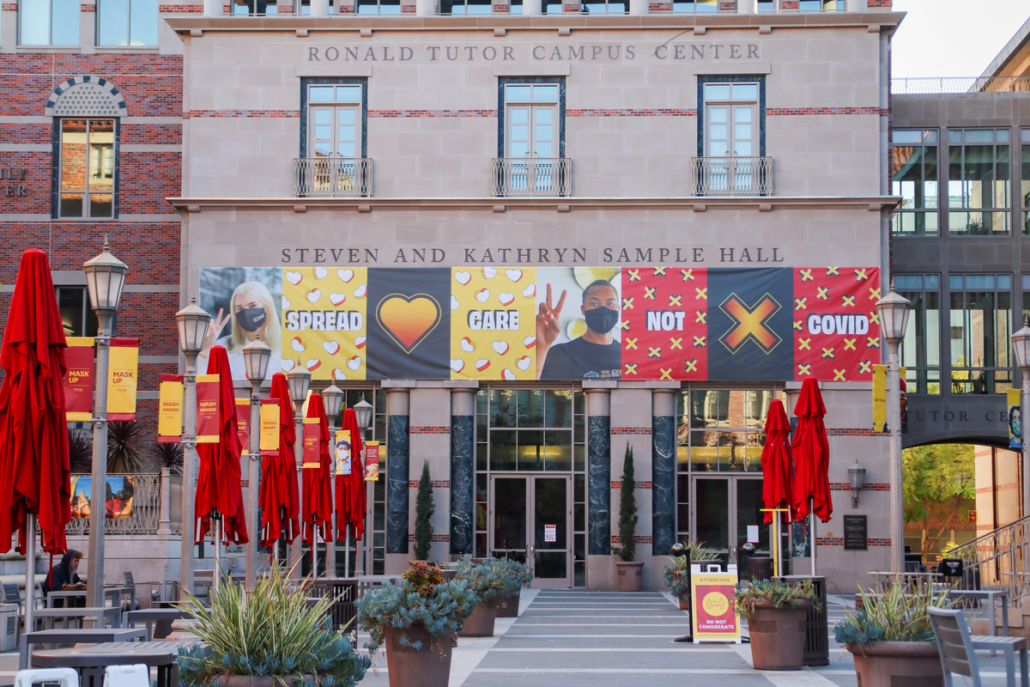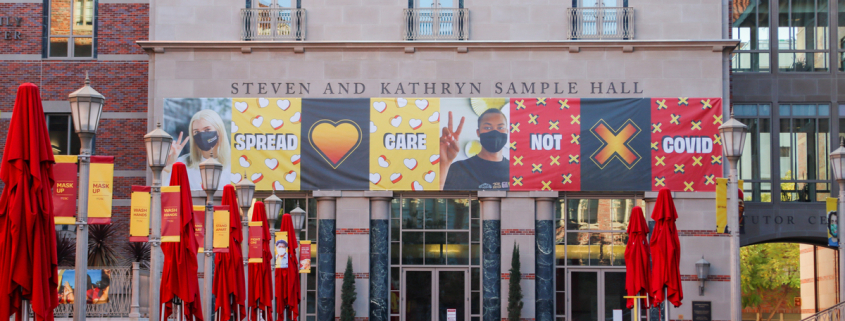COVID campaign boosts morale

Following USC’s initial move to online classes due to the coronavirus pandemic in March 2020, USC students around the world had to spend their college experience at home. To boost student morale, students in the USC Iovine and Young Academy’s Impact Lab launched the “Spread Care, Not COVID” campaign, a project to promote safe social practices and keep students united during the pandemic.
“Spread Care, Not COVID came from a place of positivity and wanting to bring a little light to the pandemic,” said Ashara Wilson, a junior majoring in arts, technology and the business of innovation. “We really wanted to highlight that engaging in these social health behaviors, by wearing the masks, by social distancing, is really how you care for one another.”
The campaign began with USC Communications reaching out to the Impact Lab to help develop a marketing strategy centered around on campus safety. The Impact Lab partners with organizations and companies, such as Mattel and Adobe, in a semester-long extracurricular course where students get the opportunity to apply their skills to the real world. In Fall 2020, the University itself was taken on as a client for the Impact Lab, which was co-led by IYA faculty Carsten Becker and Chris Swain, with this being Becker’s first time on the team.
As part of promoting a positive message and enthusiasm among students, campaign banners can be seen on different buildings across campus, including the Ronald Tutor Campus Center and Fertitta Hall. Designed by students of the Impact Lab, the banners boldly feature the slogan “Spread Care, Not COVID,” along with pictures of USC students and vibrant graphics. Becker, an adjunct IYA faculty member in communication and design, said that the message not only applies to campus, but also extends towards the surrounding neighborhood in showing that students care.
“When the neighbors see [the banners] in public transportation, they don’t have to worry because we’re actively promoting and engaging each other in safe behavior,” Becker said.
In addition to the banners, colorful Zoom backgrounds are available for download, and campaign branded merchandise, including hoodies and masks, can be purchased at the USC Bookstore.
For international students, such as Jenny Choi, the past year presented unique issues, such as being forced to fly back to their home country and struggling with extreme time zone differences. Choi, a sophomore majoring in arts, technology and the business of innovation, drew motivation from these struggles when developing the campaign.
“There is nothing really we could do at the moment other than just staying safe and keeping up with school, but I thought this campaign gave me the opportunity to actually contribute to this situation,” Choi said. “I think a lot of the students might feel the same way, so I wanted this campaign to even give opportunities to other students throughout the campus.”
The Impact Lab had to function completely remotely over the course of the campaign, creating unprecedented challenges for the team such as difficulty meeting across various time zones. However, with team members dispersed internationally, the benefit of different perspectives was brought to the table.
“[Working remotely made it] easier in certain aspects where we can all be inspired by different environments,” Wilson said. “We aren’t all in LA; we’re not all bringing that same perspective and being abroad … can help us bring our own tastes to the project.”
The team was no longer limited to students in the L.A. area. Becker said that it was beneficial in that it allowed students who were home in countries like China and South Korea to still be a part of the project.
“[It] was really important to not just get the students that live close to campus, but also those who are in parts of the world that could reach out to their friends and how they feel,” Becker said.
Particularly with this campaign, students were able to have a more personal connection to the work they completed in the Impact Lab. Not only was this team able to get hands-on experience in tackling a real world problem, but they also were able to bring change to their own community.
“I’m really grateful that I had this opportunity, because it also gives us a chance to collaborate with people in other grades and even the past years’ students,” Choi said. “Also, being able to communicate with this USC department and our mentors [taught me a lot about] communication and even mindset.”
Becker said he was proud to see the students’ hard work bring about such a positive message to both USC and the surrounding communities.
“Just seeing the energy and the positive spirit with which the students approach this made me really hopeful that we can keep working with USC Communications to keep promoting student unity and initiatives,” Becker said. “[It] made me really feel good about what just a group of eight to nine students can achieve.”

